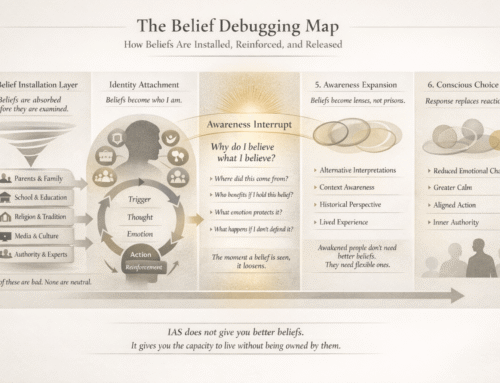In today’s productivity-obsessed world, we’re told that single-minded focus is the key to success. Focus on one goal, one skill, one path—and stick to it. It’s an attractive narrative. The myth of the lone genius who chisels away at one idea until greatness is achieved. But Alan Watts, in his gentle, grounded wisdom, invites us to consider a different view—a paradoxical approach to focus that may unlock a deeper, more fulfilling version of success.
This blog post explores that paradox, offering a map not for forcing focus, but for flowing with it. For IMMachines—a community of intuitive solopreneurs, creatives, and innovators—this shift in mindset is a key to creating meaningful, profitable work without losing your soul.
The Myth of Linear Success
From childhood, we’re taught that success is linear. Choose a goal. Set your sights. Work hard. Win. But as Watts reminds us, the world isn’t linear—it’s dynamic, fluid, and beautifully unpredictable. And our lives, if we’re brave enough to really live them, don’t unfold in straight lines.
The idea that we must concentrate everything on one solitary path can be limiting. It narrows our perspective. It makes us rigid. And it trains us to equate distraction with failure. But is life about ticking boxes on a to-do list—or about experiencing the full spectrum of what it means to be alive?
Redefining Focus: From Tension to Presence
Alan Watts flips the definition of focus on its head. Instead of brute concentration—a tightening of the mind—he speaks of focus as presence. It’s not about shutting out the world, but seeing it more clearly. More deeply. More fully.
True focus, then, isn’t effortful. It’s relaxed. Think of a musician improvising a solo, a surfer riding a wave, or a gardener tending soil with hands in the dirt. In those moments, the world drops away. Focus arises naturally, without force.
This state is known as flow. It’s where attention meets enjoyment, where skill meets surrender. It’s where your best ideas, your boldest moves, and your deepest alignment occur. Not because you controlled everything, but because you let go.
The Solopreneur’s Dilemma: Structure vs. Spontaneity
For creators and solopreneurs, this paradox of focus is especially potent. You need systems, structure, deadlines. But you also need space—space to explore, experiment, and express your genius in ways that algorithms can’t predict.
The solution isn’t to abandon structure or avoid strategy. It’s to hold it lightly. To work from intention, not obligation. To trust that your intuition, if nurtured, will lead you somewhere worthwhile—even if that path isn’t straight.
Alan Watts on Surrender
In his talk “The Paradox of Focus,” Watts compares life to a river. A river doesn’t barrel toward the ocean in a straight line. It curves, meanders, flows around rocks, adapts to terrain. Its path isn’t direct, but it’s alive.
Trying to force focus—on one idea, one goal, one metric—can make us brittle. We resist what feels like a detour. But sometimes those detours are the point. They’re where life happens. Where wisdom is learned. Where your true path reveals itself.
Watts explains that true focus doesn’t require pushing. It arises from clarity. From quiet. From being fully where you are. That’s not laziness. That’s alignment.
Productivity Without Pressure: The New Way to Work
At IMMachines, we talk about systems and frameworks, but always in service of freedom. Our goal isn’t to automate you out of your own genius, but to create containers that support your creativity.
You can create consistent content, scalable offers, and profitable digital assets—without abandoning your intuition. You can flow and still flourish.
Here’s what that looks like:
1. Create a Living System
Use tools like Notion, GPT workflows, or your custom ‘IMMachine’ to structure your work. But allow space for spontaneity. Build in time for curiosity. Use systems to free your mind, not box it in.
2. Follow Signals, Not Scripts
If something feels heavy, misaligned, or forced—it probably is. Trust the discomfort. Shift direction. Pay attention to what lights you up. Often, that’s where the gold is.
3. Define Success for Yourself
Not every path leads to six figures in 60 days. And not every win looks like a sales dashboard. Success might mean being creatively alive. Or it might mean taking a nap at 2pm because your body said so. You get to choose.
4. Let the River Teach You
Just like the river adapts to the land, let your business adapt to your season. Launch when the time is ripe. Retreat when you need to replenish. Stop shaming yourself for being cyclical. Nature is cyclical.
5. Practice Presence as a Skill
Whether you’re writing a prompt pack or selling a course, bring your full attention. Turn off distractions. Tune into your senses. Let presence be your strategy.
A Life That’s Worth Living
Watts ends his talk with a powerful truth: the goal isn’t to achieve greatness. It’s to live a life that feels great to live. That doesn’t mean abandoning ambition—it means refusing to let it define your worth.
In our digital hustle culture, this is a radical idea. That joy, not just output, is a valid metric. That who you become matters more than what you build. That a well-lived life might be the best funnel of all.
So here’s your permission: To pause. To pivot. To meander. To change your mind. To walk your own way—even if no one claps.
And maybe, just maybe, in doing so, you’ll stumble into a kind of greatness that algorithms can’t predict. The kind that’s lived, not won.






